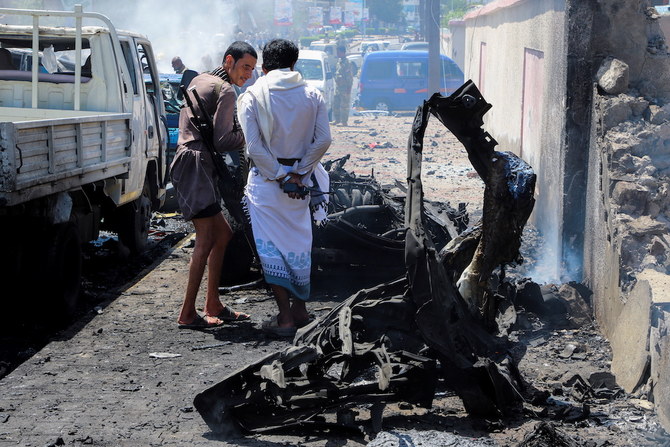AL-MUKALLA, Yemen: At least six people were killed and five injured on Sunday when a suicide bomber targeted the governor of the southern Yemen city of Aden.
Ahmed Hamed Lamlis and Agriculture Minister Salem Al-Soqatri were heading home after attending an event in Aden when an explosive-rigged car exploded near their convoy in the Tawahi district, which houses the headquarters of the separatist Southern Transitional Council.
Among the dead were the governor’s press secretary, his photographer, and the head of his security detail. “The governor is safe, thank God,” STC spokesman Ali Al-Katheri said.
No one admitted the bombing, but the STC blamed Yemen’s Muslim Brotherhood for orchestrating the attack to undermine “security achievements” in Aden.
President Abed Rabbo Mansour Hadi ordered security services in Aden to launch an immediate and comprehensive investigation into the incident to determine who carried out the attack and bring them to justice.
“Our battle with the forces of evil and terrorism and their tools and arms from the Houthi militia and Iran is an existential one,” Hadi said.
Yemen Prime Minister Maeen Abdul Malik Saeed called the attack a “cowardly terrorist operation,” and ordered security forces in the city to remain on high alert. Yemeni Information Minister Moammar Al-Eryani accused the Iran-backed Houthis, who are pressing ahead with a deadly offensive on the central city of Marib, of planning the attack in Aden to disrupt government efforts to bring peace to the liberated provinces.
“The crime, which coincides with the escalation by the Houthi militia in Marib and Shabwa, aims to shuffle the cards and thwart the government’s efforts to normalize the situation in the liberated areas,” he said.
Saudi Arabia, the US and UK denounced the assassination attempt.
"We condemn in the strongest and strongest terms the cowardly terrorist act that targeted the convoy of the Governor of Aden and the Minister of Fisheries," the Saudi Ministry of Foreign Affairs said in a statement.
Cathy Westley, the charge d’affaires of the US embassy in Yemen, said: “Such acts of terrorism will not succeed in undermining Yemeni and international efforts to end this war.”
She reiterated her support for the Yemeni government’s efforts to restore stability and improve the lives of all Yemenis.
“Horrific reports of attack on the governor’s convoy in Aden,” the British embassy in Sanaa said in a tweet, adding: “We condemn all acts of violence, especially those targeting officials in public service.”
It added that “the people of Aden need security,” and called for implementing the Riyadh Agreement.
Lamlis, the STC secretary-general, was appointed Aden governor last year under the Riyadh Agreement, a power-sharing deal signed in late 2019. The agreement sought to defuse tensions between the STC and Yemeni government and paved the way for the formation of a new administration that included separatists, who agreed to rescind their controversial self-rule of southern provinces. Al-Soqatri, who is also a senior member of the council, was named minister of agriculture in the shared government formed last December.
Aden, Yemen’s interim capital, has been beset by violence since its liberation from Houthi forces in July 2015. In December that year, Aden governor Gen. Jaafar Mohammed Saad was killed when an explosives-rigged car ripped through his convoy.






























